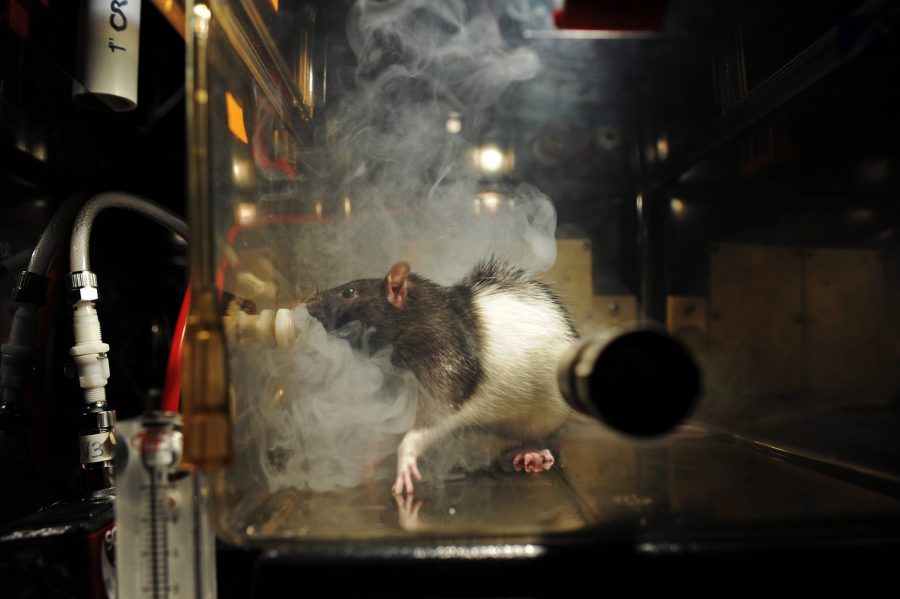Prenatal cannabis exposure may affect cognition
Rats exposed to THC while in utero exhibited decreased ability to adapt to unfamiliar tasks
College of Veterinary Medicine researchers exposed pregnant rats to cannabis vapor in an airtight chamber. The offspring was later tested for adaptability and other cognitive functions related to decision making.
April 20, 2018
As more states have legalized recreational cannabis, it has grown more popular among pregnant women. A WSU undergraduate researcher thinks the scientific community needs to take a closer look at the behavior of adults who were exposed to cannabis while in the womb.
Neuroscience senior Collin Warrick has conducted research on the effects of prenatal cannabis vapor on the cognitive flexibility of rats.
Warrick said cannabis is the most common illicit drug among pregnant women. Despite this, little to no research has been done on its effects on offspring cognition as they mature.
Warrick said the lack of medical warnings on legal cannabis products comes from this lack of research.
“I have not come across anything that has been black labeled,” Warrick said, “there is no Surgeon General’s warning against cannabis, I think primarily because there hasn’t been enough studies looking at the negative effects.”
Ryan McLaughlin, an assistant professor of integrative physiology and neuroscience who worked with Warrick, said long-term ramifications of cannabis vapor on developing offspring are unknown.
“Now that cannabis is legal for the next generation of mothers,” McLaughlin said, “they may see less of a stigma and less of a perceived harm associated with smoking a joint during pregnancy, as they would maybe from having a drink of wine or smoking cigarettes.”
Longitudinal studies — which involve repetitive observational data collection over a period of time — conducted by previous researchers on prenatal cannabis exposure have shown cognitive impairments and changes in emotionality in the offspring when they reach adulthood, Warrick said.
Rats were used for this study because they give researchers control over environmental factors and maternal care. Warrick said using animal models expedites the process between conception and adulthood, so scientists can study the subjects as they age.
Warrick wanted to see if exposing pregnant rats to cannabis vapor would impair their offspring’s ability to acquire, shift and modify strategies within tasks.
Researchers tested rats’ cognitive flexibility, or their ability to carry out and understand tasks, while adapting to new objectives. The rats were placed in a chamber with two levers, with lights above each. Half were assigned to the left lever, the other half to the right. Upon entering the chamber, a light would turn on above their preselected lever. Rats assigned to the left lever, for example, had to press it 10 times consecutively. The chamber dispensed a sugar pellet each time.
In the rats’ second test, they had to find out whether the left or right lever would produce a reward. Warrick said this tested their ability to adapt.
Finally, the rats had to press the opposite lever from the task beforehand.
Rats that were prenatally exposed to higher doses of cannabis vapor had a harder time reaching 10 consecutive correct lever pushes, according to Warrick’s research. These rats were more likely to push the lever yielding a reward less than 10 times and then go back to pushing the lever first assigned to them, even though it no longer resulted in a sugar pellet being dispensed.
According to Warrick’s research, this suggested prenatal cannabis exposure negatively impacted rats’ ability to shift strategies when their first one did not continue working.
He said the final results showed no difference between male and female offspring.
Warrick and McLaughlin said because this study is one of the first of its kind, their options to continue research in similar fields are endless. They said they would be interested in researching a more neuroscience-based approach by studying how cannabis affects the prefrontal cortex, which is associated with cognitive behavior and decision-making.









